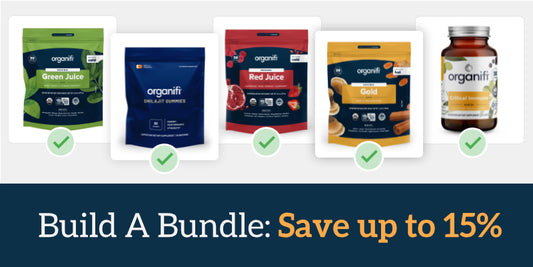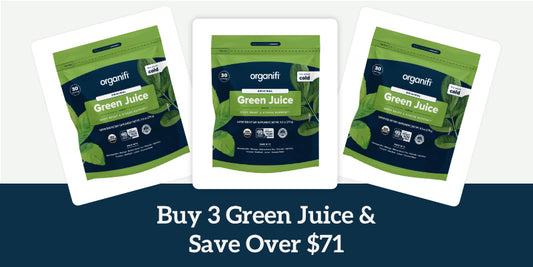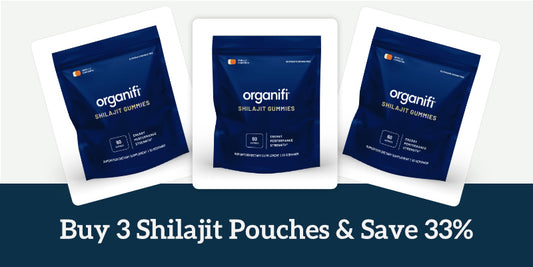Is collagen vegan?
Collagen is the most abundant protein in animals. It is responsible for the structure, stability, and strength of hair, skin, nails, bones, ligaments, connective tissue, and more. It is not vegan, but vegans, vegetarians, and plant-based diets can get the benefits of collagen support without ingesting animal byproducts.
There are ways to naturally boost and maintain collagen production in the body, combining plant-based foods that stimulate collagen production for healthy aging. We’ll explain them all here.

If you’ve chosen a plant-based life - whether for the animals, the environment, or your health - chances are you’ve asked yourself “is collagen vegan?” Right after wondering where to get Vitamin B12, and whether you are, in fact, getting enough protein.
The good news is, if you’re eating mostly whole foods and a balanced diet, you’re probably meeting most of the daily recommended doses for all macronutrients (carbohydrates, fats, and protein) and micronutrients (vitamins and minerals) needed to live a healthy life.
However, if you’re always on the go, miss a meal or two, or return to the same foods over and over - you could have some nutritional deficiencies. Just like omnivores!
Plant-based or vegan nutrition can be very healthy and complete, but all diets need a little help from time to time.
And that’s OK!
The not so great news? Collagen could be one of the few nutrients a vegan, vegetarian, or plant-based diet could lack. Is collagen vegan? Not really:
Collagen is a protein found in animal tissue that your body produces naturally in healthy amounts, right up to your mid-20s.
Studies show collagen production starts to decline around the age of 25, contributing to natural aging.
This is why collagen support supplements have recently become very popular; (and probably why you asked yourself “is collagen vegan?” In the first place) a growing body of research shows they may help you grow stronger and shinier nails, hair, and skin.
Collagen support could also prevent, repair, or improve the appearance of wrinkles and other signs of aging.
If omnivores (or meat eaters) seek collagen support, it’s only natural plant-based people would too. There’s nothing wrong with getting a little nutritional help, and fortunately for you, there are easy ways to get “vegan collagen” - without sacrificing your diet or morals.
Below the answer to the most frequently asked collagen support questions:
- What is collagen made of?
- Benefits of collagen supplements
- Vegan collagen alternatives
- Nutrients to boost natural collagen
Facts and Tips About Collagen and Vegan Collagen
What is collagen made of?
In a previous article, we answered the question “what is collagen?” in depth, so we will give you a brief definition here. Collagen is essentially the glue that holds tissue together; in fact, its name comes from the Greek word for glue, “kólla,” and the suffix “gen,” which means "producing.”
Collagen is a protein made out of several chains of amino-acids that form a helix shape; it is mostly composed of Glycine, Proline, Hydroxyproline, and Arginine.
It is fibrous in nature and insoluble, meaning it cannot be broken down by water, and it makes up approximately 70% of the skin and 30% of the total protein content in your body.
It performs an essential role in elasticity and body regeneration. There are at least 16 types of collagen, but 80 – 90% of the collagen in the body consists of types I, II, and III.
Is collagen made from animals?
In nature, collagen is almost exclusively made from animals, but there are collagen alternatives that are either made out of genetically modified bacteria or collagen support boosters that use plant-based foods that stimulate collagen production.
What is collagen derived from?
Collagen is generally derived from connective animal tissue, just as humans naturally produce collagen, animals like cows, chickens, pork and fish have collagen too in their cartilage, bones, and hides - where it is usually sourced from.
Omnivores need collagen support too because animal muscle meat does not have all the amino acids collagen does. Today, people don’t eat all nutrient-rich parts of an animal as they did in the past (like liver or bone broth,) instead focusing on muscle meat.
What are Collagen Peptides? How is Collagen Made?
When researching “what is collagen made of,” you may come across the term “Collagen Peptides,” which may be confusing. Peptides are short chains of amino acids, different from protein on the mere basis of size.
Collagen peptides are just smaller versions of this vital protein. They are separated from the original source through hydrolysis, which breaks down the molecular bonds between collagen strands and peptides using water and other biochemical means.
Many of the amino acids naturally contained in animal collagen are lost during this process and collagen supplement manufacturers must add them in a later step to the mix.
Is collagen vegan? Is there plant-based collagen?
We’ve already answered this but to be clear: no, collagen is not vegan, but the collagen in your body can be stimulated in a vegan way. All animal collagen, as most animal protein in general, is produced naturally from plant-based sources.
Are collagen supplements vegan?
If the ingredients include collagen peptides, no. The truth is, you can't replace collagen with a “vegan collagen” alternative, but you can take collagen support foods or supplements that encourage your body to produce more of its own supplies like you would do with vitamins or alternative complete vegan protein.
Are There Vegan Collagen Alternatives?
Yes, there are vegan collagen support alternatives! If you were asking yourself “is collagen vegan?” you’re probably looking for a natural way to strengthen your nails, have shinier or more abundant hair, and slow down the aging process of your skin.
These collagen supporting foods or supplements could be the answer you’re looking for:
|
Collagen Supporting Nutrient |
Where to Find It |
Why Choose It |
|
Vitamin C (vitamin) |
Lime, lemon, orange, all citrus fruits, broccoli, rosehip, Camu Camu, papaya, cauliflower, kale, mango, kiwi, pineapple, and strawberries |
Vital for collagen production and synthesis, it adds oxygen and hydrogen to the collagen chain, to form a strong helix. |
|
Proline (amino acid) |
Asparagus, cabbage, chives, cucumbers, beans, peanuts, buckwheat, garbanzo beans, soy, and watercress. |
Plays a key role in collagen production and maintenance, it’s one of the two amino acids that make 23% of all collagen. |
|
Lysine (amino acid) |
Tofu, spirulina, brewer’s yeast. Complete protein supplements. |
Essential amino acid, your body can’t make it. |
|
Anthocyanin (flavonoid) |
Blueberries, blackberries, raspberries, red cabbage. |
May stabilize collagen and suppress inflammation. |
|
Arginine (amino acid) |
Eggs, sesame seeds, spirulina, yogurt, coconut, and kefir. |
It stimulates collagen production and synthesis in bones. |
|
Vitamin A (vitamin) |
Carrots, kale, squash, broccoli, sweet potatoes, fruits like apricots, mango and watermelon. |
Complete Vitamin A is only available in animal foods (retinol) but Vitamin A stimulants are available in plant carotenoids. Vitamin A stimulates collagen production. |
|
Silica (mineral) |
Bamboo silica, oatmeal, brown rice, green beans, bananas, spinach. |
An essential component of elastin and collagen support, necessary for all connective tissue. |
|
Zinc (mineral) |
Seeds, nuts, and beans like black beans, kidney beans, black beans, pumpkin seeds, sunflower seeds, and chia seeds. |
Cofactor in collagen production, it activates the proteins that produce more collagen. |
|
Manganese (trace mineral) |
Seaweed, pineapple, dark leafy greens, nuts, and grains. |
It increases the enzyme responsible for proline formation, supporting collagen and elastin. |
|
Copper (trace mineral) |
Lentils, mushrooms like tremella and, greens, blackstrap molasses, apricots, almonds, dark chocolate. |
Increases production or utilization of collagen and elastin. |
Alternatively, you could try to get supplements for all individual nutrients and amino acids, but it may be challenging as they are not all easy to find. Once you know what is collagen made of and what supports it, you can find a supplement that meets your needs.
Organifi Glow a Vegan Collagen Support Supplement
We love healthy, shiny, glowing skin, hair and nails - just look at our timeless skincare ideas- and it’s not just because it looks great, there are studies on how to boost immunity with skin care; skin is your largest organ and a big part of your defenses!
So, naturally, we had to create a collagen support supplement with nothing but the best superfoods available to help you get that radiant and supple look.
Organifi Glow is our collagen boosting superfood blend featuring thirteen ingredients combining vitamins, minerals, and amino acids that help restock and grow your own collagen stores without harming animals.
It combines bamboo silica, aloe vera, tremella mushroom, rosehips (yes! It’s edible too,) Vitamin C superfoods like lemon, Camu Camu, pomegranates, baobab, raspberry and amla, with coconut water, pink Himalayan salt (may increase hydration and balance pH) and the sweet taste of monk fruit. With only two grams of sugar, it’s a hydrating and replenishing treat to help you glow from the inside out.
Bottom Line:
Is collagen vegan? No, but collagen support supplements can be. This essential protein may have rejuvenating properties for people following a plant-based and omnivore diet, but neither is obligated to get it from animal sources if they don’t want to.
We hope this answers your questions about how collagen is produced, what collagen is made of, what is collagen or a collagen peptide and why you need it. If you found it useful, please share it with a friend and drop us a note. Don’t forget to tag us in your Glow success stories!





1 comment
I would like to order Organifi Glow.